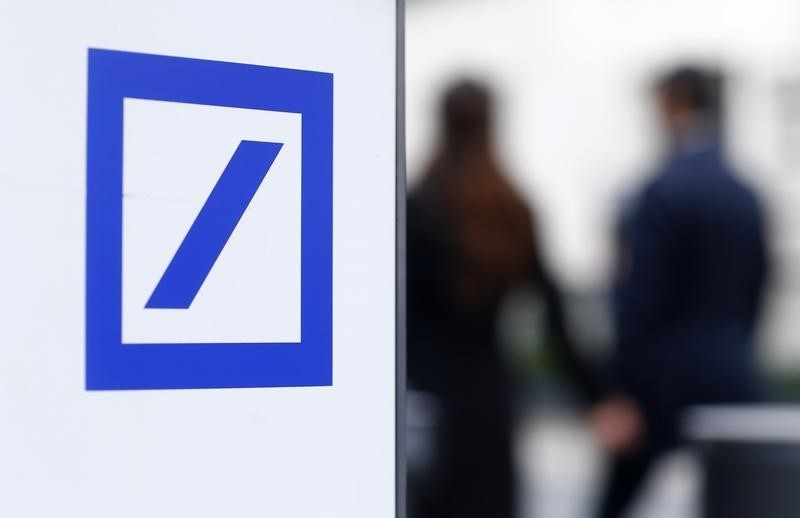By Arno Schuetze
FRANKFURT (Reuters) - Deutsche Bank (DE:DBKGn) said it would sacrifice its 2015 and 2016 dividends as new Chief Executive John Cryan seeks to bolster the bank's capital and retain money to pay for sins of the past.
Cryan is under pressure to overhaul Germany's biggest bank, with costly litigation from past scandals and fallout from a market rout in Asia pushing its valuation well below rivals.
Deutsche Bank said on Wednesday it was targeting a reduction of its risk-weighted assets to about 320 billion euros ($349 billion) by end-2018 from 416 billion euros at the end of June - towards the top end of analysts' expectations.
"The plan is based on the elimination of the Deutsche Bank common share dividend for the fiscal years 2015 and 2016," it said in a statement, adding that it aimed to resume paying dividends thereafter "at a competitive payout ratio".
Ever since its post-World War Two reestablishment in 1952, Deutsche Bank has always paid a dividend.
Earlier this month, the lender announced it would split its investment bank in two and part ways with three of its eight management board members.
The bank also said it was aiming to bring down adjusted non-interest expenses to less than 22 billion by 2018 from 23.8 billion euros in 2014, and to reduce its cost/income ratio to 70 percent in 2018 from 84.3 percent at the end of June.
By comparison, peers Barclays (L:BARC), Credit Suisse (VX:CSGN) and UBS, which are also cutting costs and devising new strategies, currently only spend 64 to 77 cents to earn a euro.
Other major international banks such JP Morgan or UBS made swifter changes to their strategies to address persistently low interest rates and tighter regulation after the financial crisis.
As part of the revamp, Deutsche aims to cut about 23,000 jobs, or roughly a quarter of its workforce, by reducing technology activities and spinning off its PostBank unit, people familiar with the matter told Reuters last month.
Cryan said earlier this month a record pretax loss of 6 billion euros in the third quarter would also mean that staff will get lower bonuses.
While Credit Suisse, which also intends to slim down its investment bank, plans to raise 6 billion Swiss francs ($6 billion) from investors to bolster capital, Deutsche Bank has not so far signalled it is considering such a step.
The capital hike will bring Credit Suisse's capital ratio to 12.2 percent, while UBS had 14.4 percent at the end of June and the average for Europe's 24 biggest banks was 13.2 percent, lifted by high levels at Nordic lenders.
Deutsche Bank is targeting a capital ratio of at least 12.5 percent and a leverage ratio of at least 4.5 percent from the end of 2018. At the end of June, the respective readings were 11.4 percent and 3.6 percent.
